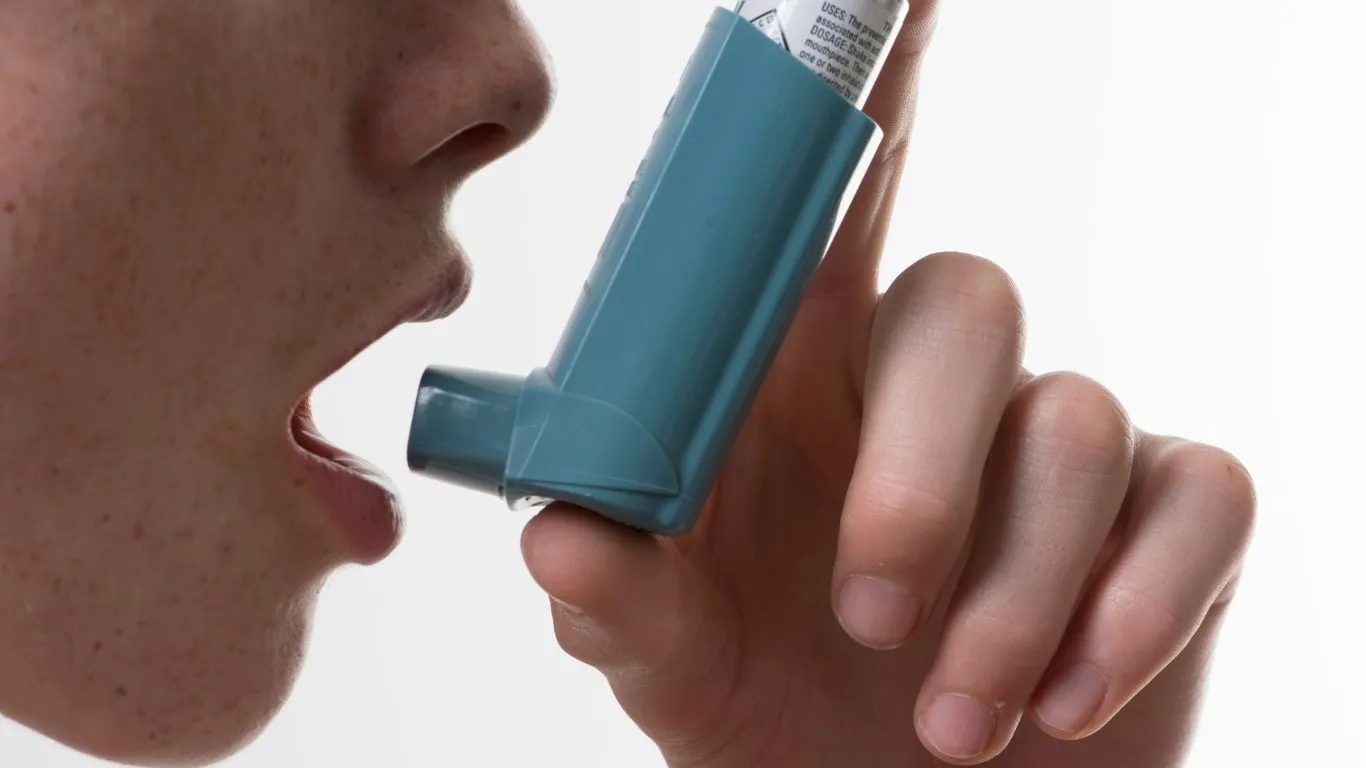Shocking Truth: Can Asthma Cause Heart Palpitations During Sleep?
Ever woken up in the middle of the night feeling like your heart is racing or fluttering, and wondered, “Can asthma cause heart palpitations during sleep?” As a pulmonary nurse practitioner with years of hands-on experience, I’ve seen firsthand how tricky asthma can be—not just during the day but especially when it disrupts your nights. It’s not unusual for people with asthma to experience these unsettling sensations, and understanding why this happens is key to managing both your breathing and your heart’s rhythm.
Understanding the Link Between Asthma and Heart Palpitations During Sleep

Asthma primarily affects your lungs, but because your body is an interconnected system, it can also influence your heart—especially at night. When asthma flares up or worsens during sleep, it can cause oxygen levels to drop or lead to increased stress on your body. This, in turn, might trigger your heart to race or feel like it’s skipping beats, which are known as palpitations.
From my experience, many patients don’t realize how common this is until it happens to them. The sensation can be downright scary, often waking them up and leading to anxiety about their health. But here’s the thing: these palpitations are usually a symptom, not a separate heart problem. That said, it’s always important to get evaluated thoroughly by your healthcare provider to rule out any other causes.
Why Does Asthma Affect Your Heart While You Sleep?
There are several reasons why asthma might cause heart palpitations during sleep:
- Reduced Oxygen Levels: Asthma attacks can narrow your airways, making it harder to breathe deeply. When you’re asleep, this can reduce the amount of oxygen reaching your bloodstream, prompting your heart to beat faster in an attempt to circulate oxygen more efficiently.
- Nighttime Asthma Symptoms: Many people with asthma notice their symptoms worsen at night. This is partly due to natural changes in hormone levels and airway inflammation that peak during the early morning hours.
- Stress and Anxiety: Struggling to breathe can cause anxiety, which activates your body’s “fight or flight” response, elevating your heart rate and causing palpitations.
- Medications: Some asthma medications, especially bronchodilators like albuterol, can cause your heart to race as a side effect.
My Personal Take: Seeing It Up Close
In my years working directly with asthma patients, I’ve witnessed this pattern numerous times. One patient, a middle-aged man with severe asthma, would frequently wake up gasping for air and complaining of a pounding heart. We had to carefully balance his asthma control with his heart health, adjusting medications and addressing triggers to help calm his nighttime symptoms. It really drove home to me how intertwined these conditions can be.
Another key takeaway from my experience is how critical it is to monitor your symptoms closely. Keeping a simple diary of your asthma symptoms alongside any palpitations or nighttime awakenings can provide invaluable clues for your doctor.
Common Triggers That Can Worsen Asthma and Heart Palpitations at Night

Knowing what sets off your asthma symptoms—and by extension, your heart palpitations—is half the battle. Here are some common culprits I’ve seen regularly in clinical practice:
- Allergens in the bedroom: Dust mites, pet dander, or mold lurking in pillows and mattresses can ignite nighttime asthma.
- Cold air: Breathing cold, dry air during sleep can irritate your airways and increase asthma symptoms.
- Acid reflux: Many asthma patients also suffer from GERD, which can worsen asthma and cause palpitations due to irritation of the vagus nerve.
- Improper medication timing: Missing your evening asthma medications or using them incorrectly can lead to nighttime flare-ups.
Addressing these triggers often makes a huge difference. For example, using hypoallergenic bedding, keeping pets out of the bedroom, or using a humidifier during dry seasons can help reduce symptoms. I always encourage my patients to take a holistic look at their sleep environment when asthma or palpitations become a nighttime problem.
How to Recognize When Asthma Is Causing Your Heart Palpitations During Sleep

One of the biggest challenges with asthma-related heart palpitations is figuring out when the palpitations are actually linked to your asthma and when they might be signaling something else. From my clinical experience, many patients confuse normal palpitations with more serious heart conditions, so understanding the signs is super important.
Here’s a simple way to spot the connection:
- Timing of symptoms: Do the palpitations happen mainly when your asthma symptoms flare up, especially at night?
- Breathing difficulties: Are you experiencing wheezing, coughing, or chest tightness alongside the palpitations?
- Triggers: Do known asthma triggers, like allergens or cold air, seem to worsen the palpitations?
- Medication link: Have you noticed palpitations after using your rescue inhaler or other asthma meds?
When these points align, it’s a strong indicator that your asthma is playing a role in your heart symptoms. That said, never ignore persistent or severe palpitations—especially if they come with dizziness, chest pain, or shortness of breath unrelated to asthma. In those cases, immediate medical evaluation is crucial.
What Happens Inside Your Body?
To put it simply, when asthma narrows your airways, your lungs struggle to get enough oxygen. This low oxygen can prompt your heart to pump faster to compensate. It’s like your heart is stepping on the gas pedal to keep oxygen flowing to your organs.
Plus, inflammation from asthma doesn’t just affect your lungs; it can also irritate nerves that influence heart rhythm. This irritation may contribute to irregular heartbeats or that fluttery feeling many describe as palpitations. From what I’ve observed, this neurological component is often overlooked but very real.
Managing Asthma to Reduce Heart Palpitations During Sleep

After years of working with asthma patients, one thing I always emphasize is that controlling your asthma well is the first step in minimizing those heart palpitations at night. Here are some practical tips I’ve found effective, both clinically and personally, to help manage these symptoms:
1. Stick to Your Asthma Action Plan
It’s not just a piece of paper—your asthma action plan is your best friend. Following it closely, especially with medication adherence, can prevent nighttime flare-ups. If you notice your palpitations spike when you’re not using your inhaler properly, it’s time to review your regimen with your healthcare provider.
2. Optimize Your Sleeping Environment
Creating an asthma-friendly bedroom makes a huge difference. Here’s what I recommend:
- Use hypoallergenic bedding to cut down on dust mites.
- Keep pets out of the bedroom to reduce dander exposure.
- Consider a HEPA air purifier if you’re sensitive to airborne allergens.
- Maintain a comfortable humidity level — not too dry, not too damp.
3. Practice Relaxation Techniques
Nighttime anxiety can amplify palpitations, so calming your mind before bed can be a game-changer. Breathing exercises, gentle yoga, or even guided meditation can ease your respiratory and cardiovascular system, making palpitations less likely.
4. Monitor and Adjust Medications
Some asthma medications, like beta-agonists, can cause palpitations as a side effect. I’ve worked with many patients to find a balance between effective asthma control and minimizing these side effects. Sometimes, it means switching medications or adjusting doses under close medical supervision.
5. Address Coexisting Conditions
Don’t overlook other issues like acid reflux or sleep apnea, which can both worsen asthma symptoms and cause heart palpitations. I always encourage patients to talk openly about all symptoms so we can manage them together.
When to Seek Medical Advice

One important lesson I’ve learned over the years is that asthma and heart palpitations can sometimes mask more serious problems. If you experience any of the following, don’t wait—reach out to a healthcare professional immediately:
- Palpitations accompanied by chest pain or pressure
- Severe shortness of breath not relieved by your usual asthma medication
- Dizziness, fainting, or near-fainting episodes
- Rapid or irregular heartbeat lasting more than a few minutes
Getting an accurate diagnosis and timely treatment can make all the difference. Often, this means a careful heart evaluation alongside your asthma management, which might include an ECG, Holter monitor, or blood tests. As someone who has coordinated care between pulmonologists and cardiologists, I can attest that a multidisciplinary approach often provides the best outcomes.
Long-Term Strategies to Manage Asthma and Reduce Heart Palpitations During Sleep

Managing asthma so it doesn’t trigger heart palpitations during sleep isn’t just about quick fixes—it requires a long-term, holistic approach. Over the years, I’ve learned that success comes from combining medical treatment with lifestyle changes, self-awareness, and teamwork with your healthcare providers.
Regular Follow-Ups and Lung Function Monitoring
One of the most important habits I encourage is staying consistent with your asthma check-ups. Pulmonary function tests and peak flow monitoring help track how well your lungs are doing and if your asthma is under control. When you catch early signs of worsening asthma, you can prevent those scary nighttime symptoms—including palpitations.
From my own practice, patients who keep up with these visits tend to have fewer hospitalizations and nighttime awakenings. It’s all about staying ahead of the game.
Smart Medication Management
Asthma treatments have come a long way, and tailoring your medication is key. Inhaled corticosteroids, long-acting bronchodilators, and sometimes biologics can reduce airway inflammation, making asthma less likely to flare up at night. Of course, these meds might come with side effects, so open communication with your doctor about any palpitations or unusual symptoms is essential.
I’ve seen patients feel more confident and sleep better once their asthma meds are dialed in just right. If your rescue inhaler causes palpitations, let your provider know; there may be alternatives.
Incorporating Healthy Lifestyle Habits
Exercise, diet, and stress management might not sound like they’re directly related to asthma and heart palpitations, but trust me—they matter.
- Regular exercise: Improves lung capacity and heart health, but always talk to your provider before starting a new routine, especially if you have asthma.
- Balanced diet: Eating anti-inflammatory foods like fruits, vegetables, and omega-3 rich fish can help reduce airway inflammation.
- Stress reduction: Chronic stress can worsen asthma and trigger palpitations. Practices like mindfulness meditation, deep breathing, or even hobbies you love can make a huge difference.
Personally, I’ve found that teaching my patients breathing exercises—not just for asthma but for anxiety—helps them regain control over those nighttime symptoms.
The Role of Sleep Hygiene and Its Impact on Asthma and Palpitations

Good sleep hygiene is often overlooked but incredibly powerful. Poor sleep habits can aggravate both asthma symptoms and heart palpitations. I always advise my patients to create a calming bedtime routine and environment.
Here are some tips that have helped many of my patients:
- Keep a consistent sleep schedule—go to bed and wake up at the same time every day.
- Avoid caffeine and heavy meals close to bedtime.
- Limit screen time before bed to reduce blue light exposure.
- Use comfortable pillows and mattresses designed to reduce allergen exposure.
Remember, when your body is well-rested, your respiratory and cardiovascular systems work more smoothly, which can significantly reduce nighttime palpitations.
When Asthma and Heart Palpitations Signal Something More
Although asthma-related palpitations are usually benign, sometimes they can hint at a more serious issue. For example, prolonged or frequent palpitations might suggest an underlying arrhythmia or cardiovascular condition that requires further evaluation.
One important lesson I’ve learned from collaborating with cardiologists is not to assume all palpitations in asthma patients are from asthma itself. If symptoms persist despite optimal asthma control, it’s time to dig deeper with tests like ECGs or Holter monitors.
Ultimately, a personalized approach is the best way forward. Your healthcare team can guide you based on your unique history and symptoms.
References
Disclaimer
The information provided in this article is intended for educational purposes and should not replace professional medical advice, diagnosis, or treatment. If you experience persistent or severe symptoms, including heart palpitations or breathing difficulties, seek immediate care from a healthcare professional. Always consult your doctor before making changes to your treatment plan.

Bianca Nala is a compassionate Nurse Practitioner with a strong background in primary and respiratory care. As a health writer for Healthusias.com, she combines her clinical expertise with a talent for clear, relatable storytelling to help readers better understand their health. Bianca focuses on topics like asthma, COPD, chronic cough, and overall lung health, aiming to simplify complex medical topics without losing accuracy. Whether she’s treating patients or writing articles, Bianca is driven by a single goal: making quality healthcare knowledge accessible to everyone.







